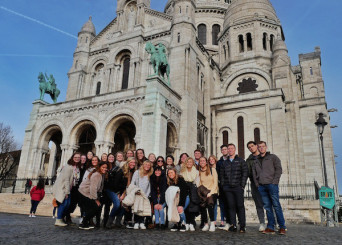Setting off on a study abroad journey is an exciting opportunity, but the financial aspect can often be a significant burden and challenge for students and their families. Understanding that feeling, David Crout, Director of Off-Campus Programs at the Hubbard Center, recently conducted an informative workshop “Funding for Off-Campus Study” to break down the study abroad funding and scholarships, providing students with a comprehensive guide to making their international academic aspirations a reality. The workshop had two sessions, happening at the Watson Forum on Feb. 25.
Crout's workshop brought invaluable information, beginning with a thorough exploration of the diverse array of scholarships available. Students were taught that scholarships are not only limited to academic merit alone but also include need-based aid, program-specific grants, and prestigious national awards. Crout highlighted key sources of funding, ranging from program providers, such as AIFS Abroad, CEA/CAPA, and IES abroad, to governmental organizations, like Gilman and Fulbright scholarships, and nonprofits, emphasizing that diligent research is really important to discovering these opportunities.
Crout also offered some practical tips in managing study abroad expenses effectively. He mentioned the significance of opting for cost-effective housing options, such as self-catering accommodations, and the advantages of booking flights well in advance to secure reasonable rates. These insights provided students with strategies to reduce the financial burden associated with international education.
Besides financial considerations, Crout underscored the transformative power of studying abroad: "People who study abroad tend to have better salaries." Immersing themselves in new cultures and environments can help students enhance their academic experience and develop invaluable life skills such as adaptability, cultural competence, and global awareness. These qualities enrich personal growth and develop career prospects in an increasingly interconnected world.
In conclusion, the “Funding for Off-campus Study” workshop inspired students to navigate the wide range of study abroad funding. By discovering scholarships and offering practical advice, students would feel more confident and prepared to begin their international academic journeys.



